The 7Yunnan (七彩雲南) restaurant chain is operated by a woman from a Chinese minority group, and it serves cuisine from her native Yunnan Province at five locations across Taoyuan County.
At the Bade (八德) location, the dining area is warmly lit and adorned with colorful handicrafts, such as a collection of candy apple-red hats woven by the Dai (傣) people, sourced from Yunnan province.
Dishes arrive briskly — often with a story. Like this one, about Crossing the Bridge Noodles (過橋米線, NT$100): A woman in Yunnan invented it to keep her husband at peak health while he studied alone for the imperial exams. To get to his dormitory, she had to travel over a long bridge, so she created a soup that would stay piping hot and carried the meal in an earthen pot.
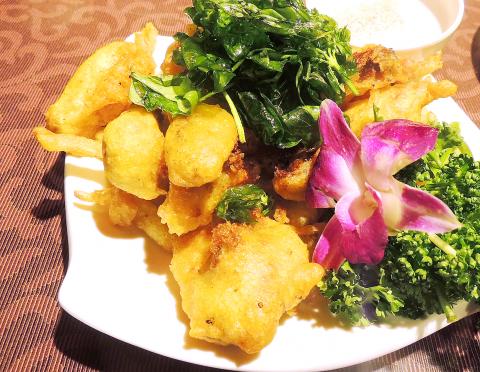
Photo: Enru Lin, Taipei Times
This is the best-selling dish at 7Yunnan, and it is also one of the best-known from the province. The Taoyuan version is also served in an earthen pot. It contains chicken broth with thin meat slices, rice noodles, julienned carrots, garlic and cilantro and a glistening layer of clarified fat to trap heat. You can request that it all arrive in the pot, or have the ingredients brought out separately so you can cook them on your own, hot-pot style. Either way, it’s a comforting and filling dish that you can eat a lot of because the broth is velvety and subtle, salted in a mildly pleasant way.
Other menu items are spiced much more heavily. 7Yunnan has a few dishes similar to Sichuan food: firecracker colored soups, meats showered with peppercorns that range from spirited to incendiary. There are also dishes that are sweet and sour, or intensely salty and savory, in the way of the better-known Vietnamese or Thai cuisines.
The butter-battered soft-shell crab (奶香黃薑蟹, NT$250) has Thai influences and came highly recommended by the server. This dish — steaming, flavorful and very tender chunks of crab — is very magical, though it’s also a shock of trans fats that could delete two days from your life expectancy. It consists of roughly chopped soft-shell crabs, encrusted in a deep-fried spiced batter that includes fresh ginger, and topped with crispy fried basil.
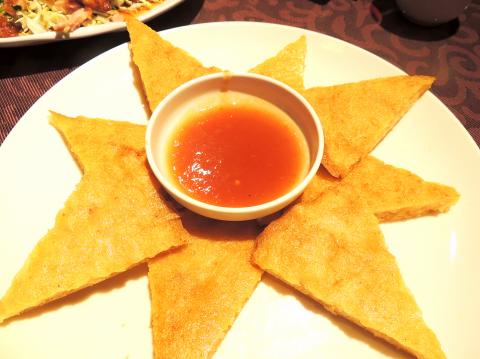
Photo: Enru Lin, Taipei Times
Moon Shrimp Cake (月亮蝦餅, NT$200) is a second dish that you could also find at a Thai restaurant. It’s a standard eight triangles arranged like a star around a dipping sauce, but the thin little pancakes are made from scratch and embedded with morsels of real shrimp.
In addition, 7Yunnan serves foods native to the large population of minority peoples in Yunnan. The squid cold plate (傣味拌花枝, NT$180), borrowed from the Dai people, arrives looking like an inexpert onion-rich stir fry, though in reality it’s pretty thoughtfully composed. The sharpness has been drawn out of the onion with a vinegar marinade, and the onion combines with the celery and baby tomatoes to create a sweetly tart punch. The squid is springy, but with a flatlining saltiness on its own. When that’s eaten with a bit of the vegetable haystack, nearly all the flavors are there, in a funky, refreshing dish that’s a lot like ceviche.
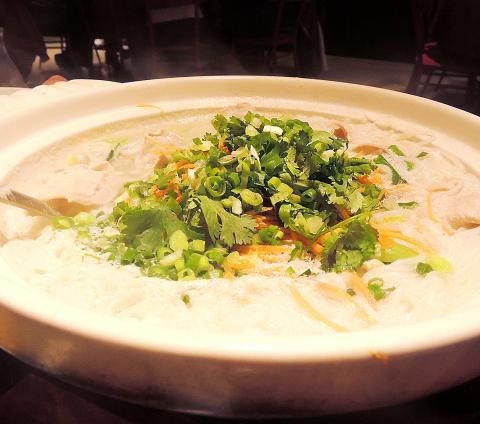
Photo: Enru Lin, Taipei Times
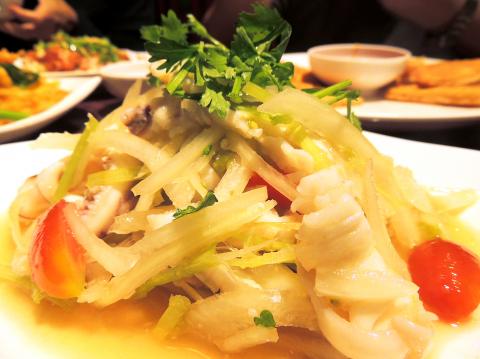
Photo: Enru Lin, Taipei Times
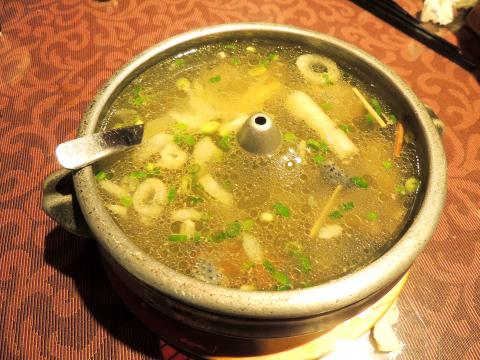
Photo: Enru Lin, Taipei Times

Aug. 4 to Aug. 10 When Coca-Cola finally pushed its way into Taiwan’s market in 1968, it allegedly vowed to wipe out its major domestic rival Hey Song within five years. But Hey Song, which began as a manual operation in a family cow shed in 1925, had proven its resilience, surviving numerous setbacks — including the loss of autonomy and nearly all its assets due to the Japanese colonial government’s wartime economic policy. By the 1960s, Hey Song had risen to the top of Taiwan’s beverage industry. This success was driven not only by president Chang Wen-chi’s

Last week, on the heels of the recall election that turned out so badly for Taiwan, came the news that US President Donald Trump had blocked the transit of President William Lai (賴清德) through the US on his way to Latin America. A few days later the international media reported that in June a scheduled visit by Minister of National Defense Wellington Koo (顧立雄) for high level meetings was canceled by the US after China’s President Xi Jinping (習近平) asked Trump to curb US engagement with Taiwan during a June phone call. The cancellation of Lai’s transit was a gaudy

From Godzilla’s fiery atomic breath to post-apocalyptic anime and harrowing depictions of radiation sickness, the influence of the nuclear bombings of Hiroshima and Nagasaki runs deep in Japanese popular culture. In the 80 years since the World War II attacks, stories of destruction and mutation have been fused with fears around natural disasters and, more recently, the Fukushima crisis. Classic manga and anime series Astro Boy is called “Mighty Atom” in Japanese, while city-leveling explosions loom large in other titles such as Akira, Neon Genesis Evangelion and Attack on Titan. “Living through tremendous pain” and overcoming trauma is a recurrent theme in Japan’s

As last month dawned, the Democratic Progressive Party (DPP) was in a good position. The recall campaigns had strong momentum, polling showed many Chinese Nationalist Party (KMT) lawmakers at risk of recall and even the KMT was bracing for losing seats while facing a tsunami of voter fraud investigations. Polling pointed to some of the recalls being a lock for victory. Though in most districts the majority was against recalling their lawmaker, among voters “definitely” planning to vote, there were double-digit margins in favor of recall in at least five districts, with three districts near or above 20 percent in